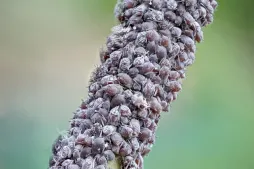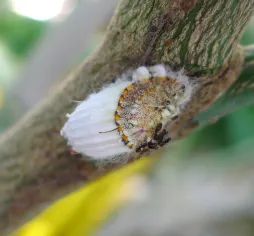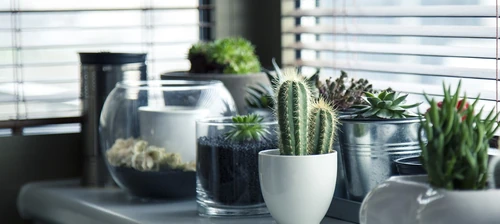Mammillaria bombycina, the silk cushion cactus
Like mammillaria zeilmanniana, Mammillaria bombycina is native to Mexico. Its curved spines and pink flowers also delight collectors the world over. So much so that the species is now threatened in its native country by wild harvesting.
How to recognize Mammillaria bombycina?
A solitary cactus that sometimes produces offshoots, Mammillaria bombycina grows to no more than 20 centimetres in height.
The spherical, bright-green to dark-green stem is made up of conical or cylindrical tubers. In addition to its white bristles, Mammillaria bombycina has two types of spines: long, curved brown prickles and short, straight white prickles.
The cactus blooms in spring. It then adorns itself with pink, funnel-shaped flowers. They measure no more than two centimetres in diameter and bloom during the day, at the top of the stem.
Mammilaria bombycina then produces a white, purple or silver-grey berry. The berry contains the tiny black seeds used for propagation.
The plant is not toxic to humans or animals when ingested. However, its white hairs can cause irritation and its spines can cause wounds. Wear gloves to protect yourself when repotting or moving your Mammillaria bombycina.
Our maintenance tips
Your plant needs watering in winter only when the temperature is above 18°C. If it spends the off-season outdoors or in an unheated greenhouse, you can stop watering between November and March.
Watering
Your Mammillaria bombycina supports mains water. You can water it with reclaimed rainwater or tap water.
Before watering, make sure the surface of the soil is at least five centimetres dry.
Don't forget to drain any stagnant water in the saucer or planter.
Spray
Your mammillaria bombycina hates wet foliage. You must not mist the plant.
Repotting
In spring, transfer your Mammillaria bombycina to a larger pot, so that it can continue to grow.
Obtain a pierced pot one size larger than the previous one.
Fill the bottom with a very light, draining substrate such as commercially available potting soil for cacti and succulents. Plant your Mammillaria bombycina in the center and add potting soil. Stop a few centimetres below the rim of the pot to form a watering trough.
Tamp down and wait three or four days for the soil to dry before watering.
Fertilization
You can stimulate the development of your plant during its growth phase, in spring and summer, with fertilizer.
If you want to stimulate the growth of your Mammillaria bombycina, mix a liquid fertilizer for cacti and succulents with the water when watering.
Plantation
Once the last spring frosts have passed, you can plant.
Choose a place where rainwater runs off easily, the top of an embankment or a location with chalky soil.
Dig a hole slightly larger than the root ball. Prepare a draining substrate, e.g. A mixture of sand and garden soil. Plant your Mammillaria bombycina and fill in. Tamp and water. This first watering helps to promote contact between the soil and the roots.
Seedling
Your seedlings need warmth. Summer is the best time to get started.
Fill a perforated pot with potting soil for cacti and succulents. You can also mix horticultural potting soil for seedlings (two-thirds) with gravel or sand (one-third). Water the soil to keep it moist, but not soggy.
Place your seeds on the substrate. If they're very small, you don't need to cover them with soil.
Seedlings take better if they 're stifled. Place your pot in a mini greenhouse or cover them with a transparent plastic bag. Your seeds also need heat to grow. You can use a heating mat to maintain a temperature of between 23 and 27°C. Place the cuttings in semi-shade.
Open your greenhouse for a few minutes a day and spray the substrate to keep it moist.
Cutting
Cutting is carried out during the strong growth phase, generally in spring and early summer.
After a few years, your Mammillaria bombycina produces shoots. You can divide them to multiply the plant.
Once the plant has been dug up, separate one of the shoots, with its roots. Beware of thorns! Remember to wear gloves when handling your Mammillaria bombycina.
Pour a well-draining substrate into a perforated pot. Potting soil for cacti and succulents, for example.
Plant your Mammillaria bombycina in the center and tamp it down.
Diseases / Threats
Information
| Family | Cactaceae - Cactaceae |
| Type | Mamillaria - Mammillaria |
| Species | Mammillaria bombycina - Mammillaria bombycina |
| Lifecycle | Perennial |
| Foliage | Evergreen |
| Exposure | |
| Substrat | |
| Planting methods |
Open ground In pots In tubs |
| Categories | |
| Tags |
Beginner Flowery Small pot |
| Origin |
Central America |
| Hardiness (USDA) | 10a |
| Leaf color |
|
| Flower color |
|
| Fruit colors |
|
Discover plants from the same family
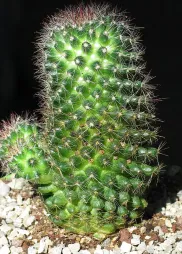
Mammillaria zeilmanniana
Discover
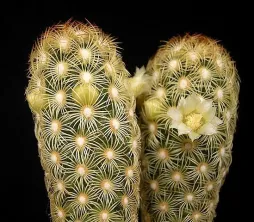
Mammillaria elongata
Discover
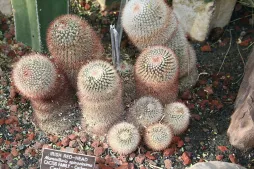
Mammillaria spinosissima
Discover
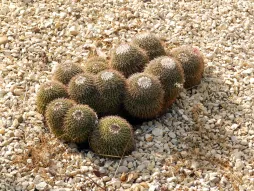
Mammillaria polythele
Discover














